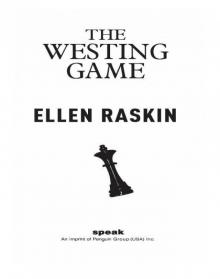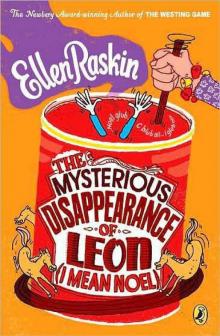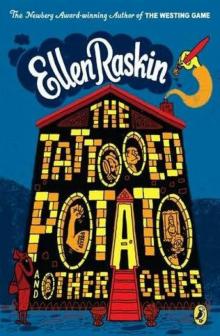- Home
- Ellen Raskin
Figgs & Phantoms Page 4
Figgs & Phantoms Read online
Page 4
“Just passing by,” Kadota explained. “Had to look in on Sophie Davenport’s goat. Terrible case of indigestion. The poor nanny ate two teapots; the Chelsea wasn’t so bad, but the pewter nearly did the critter in.”
Mona was impressed with Kadota’s wild fib.
“By the way,” he continued, “I’m driving to Middletown tomorrow; got a cow there that’s ready to drop. Want to come along for the ride, Flo? You too, Mona.”
“What an amazing coincidence,” Mona exclaimed, clapping her hands in feigned surprise. She was overplaying her role, but she didn’t have the stage experience Kadota had. “We were just talking about spending the day in Middletown, weren’t we, Uncle Florence?”
“Well, as a matter-of-fact,” Florence began, but his brother had already risen and was heading for the door, the mongrel asleep in his arms.
“I’ll pick you up tomorrow morning in Acorn Alley. We can talk about it some more at the twins’. It’s Capri night, you know.”
Mona had forgotten, but she didn’t grumble her usual protest. Her plan was working too well to complain about the silly family ritual.
2. CAPRIFICATION
HAVE YOU GOT great-grandfather’s diary, Flo?” Sissie asked as she bounced into the front seat of the Edsel. Caprification was a ceremony, and Sissie took charge of all ceremonies.
“Right here,” Florence said, patting the worn diary on his lap.
Sissie turned toward the back seat to make sure.
Mona climbed in next to her uncle and slammed the door hard. “Let’s go,” she said, impatient to get the evening over with.
Newt started the car. It spluttered and bucked, and at last they were on their way.
“The strangest thing happened to me today,” he said. “I was jogging down Hemlock with a sack of pai....”
Mona cleared her throat loudly.
“... a sack of paper plates,” he corrected himself.
“Paper plates?” Sissie mused aloud. “Oh, I know, you’re going to string them up around the lot to keep the birds from dirtying the cars.”
There was a moment’s silence while Newt, Mona, and Florence considered the function of car-lot decorations. Sissie’s idea did seem strangely plausible.
“Anyway,” Newt went on, “would you believe that somebody stole Ebenezer Bargain’s mail?”
“Who would do such an awful thing to that sweet old man?” Sissie asked.
Mona shrugged in wide-eyed innocence and surprise.
“It was just a mistake,” Florence said. “Old Eb is getting absentminded; the mail was on his desk all along.”
“How did you know that?” Mona asked, now really surprised. She had thought her uncle dealt with Bargain only on Giant Days.
Florence appeared uncomfortable with the question. “I can’t remember who told me. By the way, was your Figg-Newton giant composition a success in school?”
Mona went pale. She had completely forgotten about her finished composition. She had taken it with her when she had left the house in the morning; she had returned with only the auction catalogue. Over and over again, Mona retraced the day’s activities, but to no avail. There was only one place it could be. She had thrown her composition, along with the mail and newspapers, onto the top of old man Bargain’s desk!
“Are you all right, Mona?” Florence felt her forehead for a fever. Mona nodded unconvincingly.
“Maybe I’m catching your virus,” she said.
“Oh, by the way, Flo,” Newt said into the rearview mirror, “Alma Lumpholtz came by the lot with a package for you. She wouldn’t leave it; said she wanted to give it to you in person.”
“It’s probably a bomb,” Mona said. Newt and Sissie laughed, but she had not meant to be clever.
“Okay, gang, everybody out,” Newt said cheerfully as the car suddenly stalled ten blocks from the house of the three Figgs. “Must be the spark plugs.”
Truman greeted the latecomers at the door of the rambling house.
“Got stuck with another lemon, Newt?”
The greeting had been repeated so often over the years it seemed to be part of the ritual.
★ “That Truman Figg!” the people of Pineapple said. “He’s not a double-jointed idiot; he’s a triple-jointed idiot. No place too high or snug he can’t get to, but he just might paint your windows and wash your signs. Once at Sophie and Doc Davenports’ he signed his name on all the windows and painted the washer. He may be a real fancy letterer, but what can Flabby Benckendorf do with a ten-foot sign that reads ‘Benckendrug’s Dorfs’? There ought to be a law against naming idiots after presidents of the U.S.A.”
The Figg troupe, minus the Kanines, was gathered and waiting in the parlor. Fido winked at Mona, who nodded, indicating all was in order for tomorrow’s bus-painting.
“ ’Twas on the Isle of Capri
That I met her,
‘Neath the shade
Of an old apple tree....”
Singing and tapping, Sissie entered the room and bowed to imagined applause.
“Everybody ready?” she asked.
Ignoring Remus’ remark that they had been ready for half an hour, she directed the congregation into a circle in the middle of the floor. “Now, all sit down,” she commanded. “Come on, Mona.”
Draped in an easy chair, Mona glumly refused to participate.
“I’ll just watch.”
“Don’t be such a pill, Mona,” Fido said. He crossed his feet and lowered himself into the lotus position without using his hands. He was blowing his nose.
Romulus and Remus flopped down together, hand in hand.
Florence sat down almost imperceptibly, having the least way to go. His gasp of surprised pain was drowned out by the loud grunt Kadota emitted as he squatted and bounced on the carpet.
His wife, Gracie Jo, family outsider, knelt down beside him on a cushion.
Newt, always confused about which leg folded over which, was arranged by Sissie.
“Leave room for Truman,” she ordered. The floor-sitters sidled, rocked, and knocked into one another as they moved in both directions to make space for the missing brother.
“Here I come,” Truman shouted, cartwheeling down the hall. He bounded into the room with two handsprings, leaped up into a one-and-a-half twist, and landed cross-legged on the floor between the twins. He was greeted with shouts and applause.
Caprification was about to begin.
The believers closed their eyes. Florence, the eldest, smiled gratefully at the unbelievers, then reverently opened the old diary and read:
“Capri!” the Figg family shouted in unison. Florence handed the diary to the next eldest brother, and Kadota read:
“Capri!” everyone shouted. Now the book should have passed to the next eldest, but no one knew which twin was born first. Together Romulus and Remus recited their father’s entry from memory:
“Mine eyes have seen the glory
of a tree so wild and free,
That is standing on an island
that’s surrounded by the sea;
Whatsoever, howsoever,
wheresoever it may be,
All Figgs go to Capri.
Glory, glory hallelujah,
Glory, glory hallelujah,
Glory, glory hallelujah,
All Figgs go to Capri.”
“Capri!” Truman fell forward onto his palms, stood on his head, somersaulted into the air, and landed squarely on his feet.
The Rite of Caprification was over.
“Somebody give me a hand,” Kadota pleaded. Newt and Fido tugged the grunting veterinarian to his feet as, one by one, the members of the family rose from the floor and stretched their cramped muscles. The skeptics went to the kitchen to prepare refreshments, leaving the believers to debate the whereabouts of Capri.
Sissie and Newt were not tempted by the unworldly kingdom. “We like it right here with the sweet fruit,” they always said. Kadota and Gracie Jo were also unbelievers, ever since Romulus, returning f
rom a disastrous dogsled trek through Lapland, told them that no Kanines were allowed in anyone’s Capri.
Mona remained in the parlor. Although she deeply resented the clannish heresy that set the Figgs apart from the people of Pineapple, she didn’t want to miss a word Uncle Florence might have to say. Besides, she was holding down the most comfortable chair in the house.
Romulus began the debate by announcing that he was certain of finding Capri on his forthcoming trip to Niagara Falls. His brothers scoffed.
Of course millions of people had been there already, he conceded, but they had not looked where he was going to look: under the falls.
Fido laughed out loud, picturing the faces of the honeymooners when Romulus led them under the falls. He was banished to the kitchen to join the other doubting Thomases.
“Places, bah,” said Remus, who believed Capri lay in numbers. He had spent the past five years dividing the number I. “Once I get to zero, I’ll be in Capri.”
Again the brothers scoffed. He could divide i an infinite number of times, but it would still be impossible to reach zero.
“Of course it’s impossible—here,” he explained. “That’s why, when I reach zero, I’ll know that I’m in Capri. Romulus wouldn’t even recognize Capri if he found it.”
The twins glared at each other.
★ “Capri,” the people of Pineapple said. “Why don’t those Ask Me Anything twins go already and leave us in peace? Poor Alma Lumpholtz went on one of Romulus’ South American tours and spent the whole two weeks hacking her way through the jungle. Only folks she met were some naked natives who didn’t even speak English. Not that Remus can speak English, not when he’s excited. Ran up and down Hemlock once, screaming 6-9-18-5, 6-9-18-5. By the time Harriet Kluttz; figured out that the numbers stood for letters of the alphabet, her beauty parlor had burned to the ground.”
Now Florence spoke. Mona listened intently.
“Books. All man has ever known or dreamed of can be found in books,” he said. Then he doubled over, coughing and choking. He waved off Truman’s offer of a slap on the back.
“I want to go to Capri with you,” Mona said, alarmed.
Florence didn’t answer. He sat breathless and spent, tears streaming down his cheeks.
“Please, please take me with you, Uncle Florence,” Mona cried.
“Come on, princess,” Newt said, returning with a tray of cookies. “You know it’s not for real.”
“And just what is that supposed to mean, Newton Newton?” Truman Figg spluttered. “Just because you aren’t looking doesn’t mean it’s not there. Why, I myself am on the verge of finding Capri. Ever hear of a Moebius band? Take a strip of paper, twist it once and stick the ends together, and what do you have? One side that goes on forever. Infinity. All I have to do is twist my body into a Moebius band and I’ll be in Capri. I’ve just about worked it out, except for one elbow.”
“Show me, Uncle Truman,” Fido begged, carrying in a pitcher of lemonade.
“Not tonight, Fido,” Truman replied. “I’m not quite ready for Capri. I still have to finish painting a sign. It’s going to read: HARRIET KLUTTZ, HAIR SETS & CUTS. Only $3.95 for a beautiful you (including shampoo).”
3. GOING, GOING...
UNCLE FLORENCE isn’t here yet,” Mona announced when Kadota drove up to the Acorn Alley house the next morning.
“Where is he?” Kadota asked. “I just dropped Fido off at the car lot and I didn’t see him there.”
“Oh, no,” Mona wailed, leaping into the car. “Fido will spoil everything. Uncle Florence is probably still asleep in the bus. Hurry.”
Kadota screeched into the lot as Florence was scampering out of his Very Private Office.
“Sorry, I overslept,” he apologized, settling into the front seat. “Good thing you sent Fido to wake me. I thought it was one of your dogs scratching at the bus until I looked out the window. I can’t imagine why he ran away when he saw me.”
Kadota backed the car out of the lot so swiftly he nearly ran down a woman with a package the size of a shoebox under her arm.
“Figgs!” hissed Mrs. Lumpholtz.
Florence spent the long drive explaining the difficulties of completing a Joseph Conrad collection to Mona. “Many of the first editions are still easy enough to find. Even his first book, Almayer’s Folly, is obtainable, though it is expensive. But the true 1913 edition of Chance is rare, very rare.”
“Why do you need first editions when you can read a book in paperback?” Kadota asked.
“Why do you collect dogs?” Mona replied. Kadota remained silent for the rest of the trip, trying to think of an answer.
Florence continued. “The impossible book to find is the original The Nigger of the Narcissus.”
Mona gasped.
“The British printed only seven, for copyright purposes. The Americans then published what is now considered the first edition, under the title Children of the Sea.”
“That’s much better,” Mona said.
“I don’t agree,” Florence replied, “but read the book, even in paperback if you have to; then decide for yourself.” (Read, Mona, read, he thought to himself. Find friends in books when I am gone.)
“Here we are,” Kadota announced. “And if my eyes don’t deceive me, the sign is another one of Truman Figg’s misspelled masterpieces.”
There was still time to examine the books before the sale began. The Conrads were in fine condition. Mona counted the pages of advertisements at the back of the books to make certain the first editions were complete.
“Look at this, Mona.” Florence was studying a colorplate book of butterflies. “See how the colors change subtly from lavender to purple to violet?”
Mona glanced hastily at the engraving, then surveyed the shelves of books to be auctioned. “Can we bid on other books if they are good buys?”
Florence sighed. “Let’s just concentrate on the Conrads, and you can do the bidding.”
Delighted, Mona rushed to the front row to save two seats. She wanted to be sure of being seen by the auctioneer.
“Number 34,” the auctioneer called out. “Clemens. Adventures of Huckleberry Finn. Who’ll start the bidding at a hundred dollars? I have a hundred. One-ten. One-twenty....”
Mona had been twisting around to locate bidders on the earlier lots; now she sat forward, biting her lips, eyes fixed on the auctioneer, afraid of missing her opportunity.
“Sold, at one hundred and seventy-five dollars to the gentleman in the third row.”
One more number to go.
“Number 35. Coleridge. The Rime of the Ancient Mariner. I have a bid for twenty-five. Thirty, thirty-five. Fifty. Do I hear fifty-five? Sold, at fifty dollars, to the lady standing in the rear.
“Number 36. Conrad. The Secret Agent. I have a bid of twenty-five. Thirty in the fifth row, forty in the rear, forty-five, fifty, sixty dollars is bid by the gentleman in the seventh row, seventy in the rear. Do I hear seventy-five?”
Mona’s mouth was too dry to speak. Florence, arms folded, calmly waited for her to enter the bidding.
“Going at seventy, going, going....”
“Seventy-five,” Mona gasped, waving her catalogue in the air. The auctioneer looked at Florence, who nodded his approval.
“I have a bid of seventy-five dollars in the first row. Anyone say eighty?”
The seconds passed like hours as the auctioneer scanned the silent audience.
“Sold at seventy-five dollars to the young lady.”
An auction-room assistant approached Florence for a deposit, blocking Mona’s view.
“Number 74. Conrad. Youth. I have forty dollars, anyone say forty-five?”
Mona stood on her chair to see the auctioneer. “Forty-five,” she called.
“Fifty in the rear.” The auctioneer looked at Mona, who nodded. “Fifty-five in the first row, sixty in the rear.” Again Mona nodded. “Sixty-five in the first row. Anyone say seventy? Sold again to the young lady in the first row.”
Mona breathed a deep sigh and collapsed back into her seat. Her heart was pounding at a furious rate.
“Good job,” Uncle Florence whispered, and patted her moist hand.
“Number 38,” the auctioneer called. Mona and her uncle sat back and enjoyed the rest of the auction, munching on sandwiches Sissie had packed for them.
The last lot was sold at four o’clock. Impatiently, Mona, waited in line, money in hand, and was disappointed to be handed wrapped books. She had wanted to look through her purchases once more, but Kadota was honking his horn at the curb.
Kadota spent the return drive explaining why he collected dogs. It was dark when they arrived in Pineapple; it was night when Uncle Florence entered his bus.
4. GONE!
THE SPRING-GREEN BUS glistened in the Sunday morning sun. “He’s still asleep,” Newt whispered, peeking into the window.
Quietly, Sissie opened the bus door and, finger to her lips, led her family up the steps.
Mona, smiling in anticipation of Uncle Florence’s surprise, tiptoed to the cot and awaited her mother’s signal to begin singing.
“Happy Birthday to you,
Happy Birthday to you,
Happy ...”
“Wake up, Flo,” Newt shouted, shaking the little man.
“Wake up, Baby,” Sissie cried. “Wake up, wake up!”
Mona screamed.
The pineapple Weekly Journal
PUBLISHED FIFTY TIMES A YEAR
Florence Figg Dead
The curtain has fallen on one of Pineapple’s most picturesque and respected citizens. Sunday morning Florence Italy Figg, forty-five years old that day, was found dead in his green (?!) bus.
Florence Figg was born to the theatrical team of Toby and Twinkletoes Figg following their matinee performance at the Riverside Theater in Milwaukee. He was named after the great showman Florenz Ziegfeld. When old enough to realize that his parents couldn’t spell, Florence adopted the middle name of Italy in tribute to that great center of art and learning.

 The Westing Game
The Westing Game The Mysterious Disappearance of Leon (I Mean Noel)
The Mysterious Disappearance of Leon (I Mean Noel) Figgs & Phantoms
Figgs & Phantoms The Tattooed Potato and Other Clues
The Tattooed Potato and Other Clues